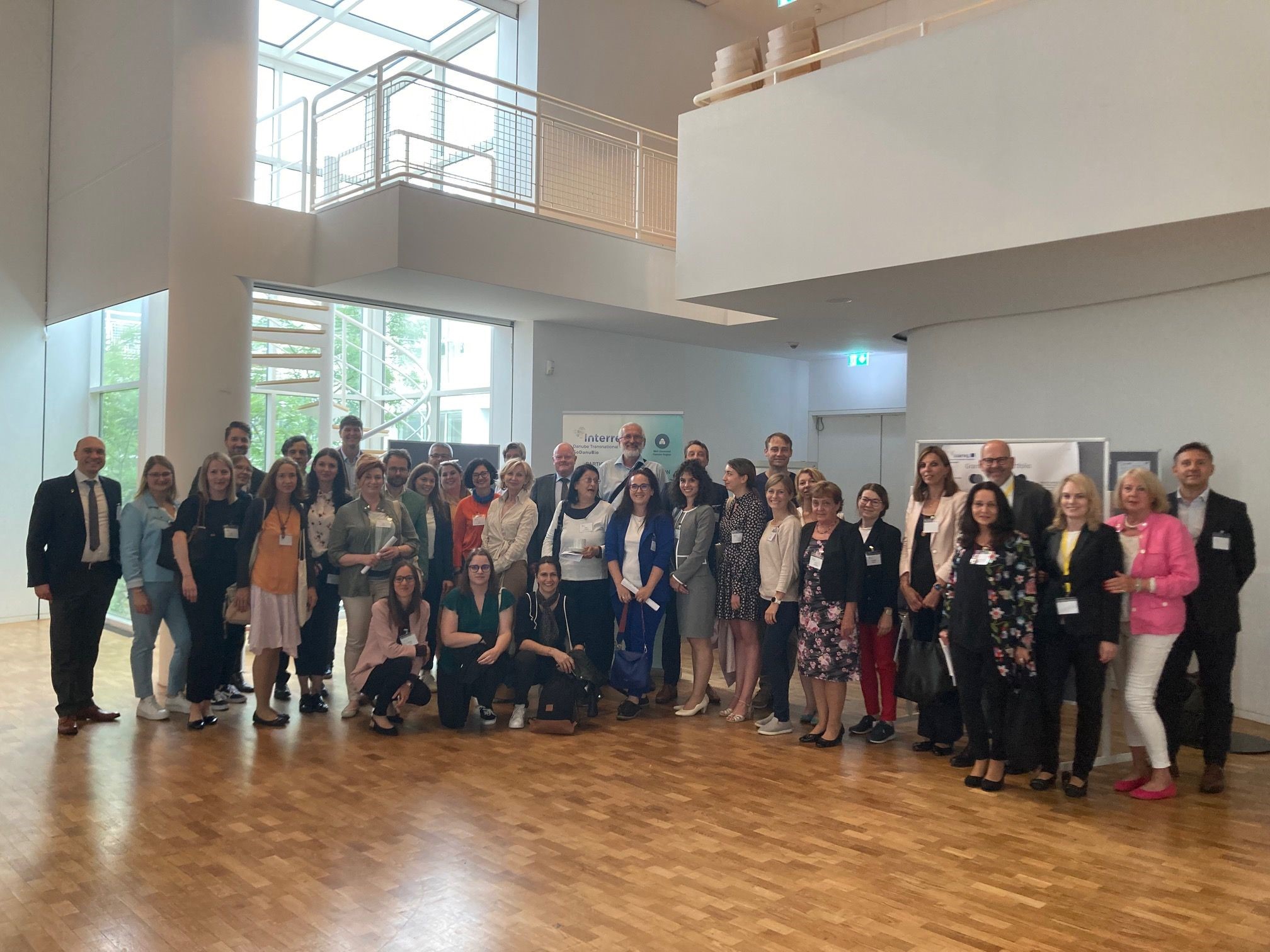GoDanuBio - PSG Meeting and Transnational Event ‘The Danube Region at the Turn of the Times - Economic policy impulses from the EU Strategy for the Danube Region’
07-07-2022

GoDanuBio PSG Meeting and Transnational Event ‘The Danube Region at the Turn of the Times - Economic policy impulses from the EU Strategy for the Danube Region’ (Ulm, 30/06/2022 – 01/07/2022)
On 1 July 2022, the GoDanuBio project held its first transnational dialogue as part of the event 'The Danube region at the turn of times: Economic policy impulses from the EU strategy for the Danube region' in Ulm, Baden-Württemberg, Germany. The organiser of the event was The Ministry of Economic Affairs, Labour and Tourism of Baden-Württemberg (BW).
During the event experts from politics, business and science discussed the impact of the war in Ukraine on the Danube region and how cross-border value chains can be made more resilient.
The conference kicked off with welcome addresses by State Secretary Dr. Patrick Rapp – Member of the State Parliament BW – and Gunter Czisch, Lord Mayor of the city of Ulm. The keynote speech was given by Alberto Valenzano from European Commission – DG GROW, who spoke about the Commission’s actions to strengthen European value chains’ resilience in the turn of challenging times.
Afterwards, Dr. Gerd Meier zu Köcker and Mr. Benedikt Seldmayr presented the upcoming project Danube Alliance for SME Competitiveness, which has a goal to increase the resilience of the supply chains in the region. The flagship project of Priority Area 8 of the European Danube Region strategy (EUSDR), running since February 2021, will build on smart services and resilient supply chains based on the experience and knowledge from other Danube projects, namely GoDanuBio and DanuBioValNet. It was presented that miscanthus was selected by the Danube Alliance as the first case study for the analysis and modelling of a value chain. The project is led by VDI/VDE Innovation+Technik and BIOPRO Baden-Württemberg is among the partners. Through cooperation with the German SME Advanced Ecologics GmbH, it is intended to establish a sustainable value network based on circular bioeconomy in the Vidin region in northwestern Bulgaria, with the help of a transport and storage system and a central biomass processing plant.
In the next session, Ms. Ana Dijan, Project Manager of Croatian Wood Cluster, which is one of the project partners of GoDanuBio, talked about how to turn residuals into value and mentioned how the wood industry and bioeconomy are old friends. Later on, one more project partner – Ms. Mateja Dermastia, CEO of Anteja ECG – presented her study on the impact and potentials of the Ukraine crisis on Supply chain development in the Danube region. She said: “More than 40 clusters in the Danube region can contribute to address the impact of disrupted value chains in the bioeconomy sector.”
In the afternoon session, during the thematic island organised by the GoDanuBio project Dr. Gerd Meier zu Köcker (CABW) and Prof. Dr. Ralf Kindervater (BIOPRO) presented the example of how the region Baden-Württemberg implements its bioeconomy strategy. Mateja Dermastia brought in the project's experiences and representatives from the Danube countries and regions discussed how transnational dialogue supported through the Danube Transnational Programme can be used for peer-learning and transfer of such good practices in policy making, where policy makers, clusters, intermediaries, research and companies need to interact in a top-down and bottom-up approach. The thematic island session was moderated by Lucia Seel.
The day before that, the members of the GoDanuBio consortium also had the chance to meet in person after many online monthly meetings, and to hold a Project Steering Group meeting (#5). During the meeting, the ongoing progress of the project was discussed and the upcoming activities for the final semester were outlined. Moreover, the individual work packages were presented by the respective work package leaders. After introductory words, the project partners held a discussion on how to tackle the challenges identified in the Integration Plan in the Danube Region, concluding activity of WPT2. Afterwards, selected project regions reported on the status of the co-creation workshops in their region. Some partners have already conducted some or all the workshops, while others are now fully engaged in planning. WP Communication highlighted the updated Action Plan and current activities. Afterwards, a joint activity with the representatives of EUSDR PA8 took place, in which the project was briefly presented by Sergi Costa (BIOPRO) and the plans of EUSDR from 2023 onwards was shortly introduced by Judit Schrick-Szenczi, PA8 coordinator. She expressed the interest of PA8 to collect emerging ideas and proposals that could be funded within the 5-year period starting in January 2023.
For further details:
BIOPRO Baden-Württemberg GmbH
GoDanuBio Lead Partner
Katrin Stökle, stoekle@bio-pro.de
Sergi Costa, costa@bio-pro.de
Bulgarian Employers’ Association Innovative Technologies
Communications Manager
Teodora Atanasova, teodora.atanasova@brait.bg
The GoDanuBio consortium is composed of: BIOPRO Baden-Württemberg (Lead Partner), Cluster Agentur Baden-Württemberg, Poly4EmI/Anteja ECG d.o.o, CLUSTERO - Romanian Cluster Association, IFKA - Public Benefit Non-profit Limited Company for the Development of the Industry, BRAIT - Bulgarian Employers‘ Association of Innovative Technologies, Ministry of Education, Science and Sport of Slovenia, Bioeconomy Cluster of Slovakia, Ministry of Economy, Entrepreneurship and Tourism of Romania, NCA - National Cluster Association, BSMEPA - Bulgarian Small and Medium Enterprises Promotion Agency, CWC - Croatian Wood Cluster, Ministry of Economy and Sustainable development of the Republic of Croatia, Ghelinta Commune, Business Upper Austria, Styrian Technology Park, ISC Konstanz e.V., Kosice Self-governing region, and Alma Mons Ltd.
